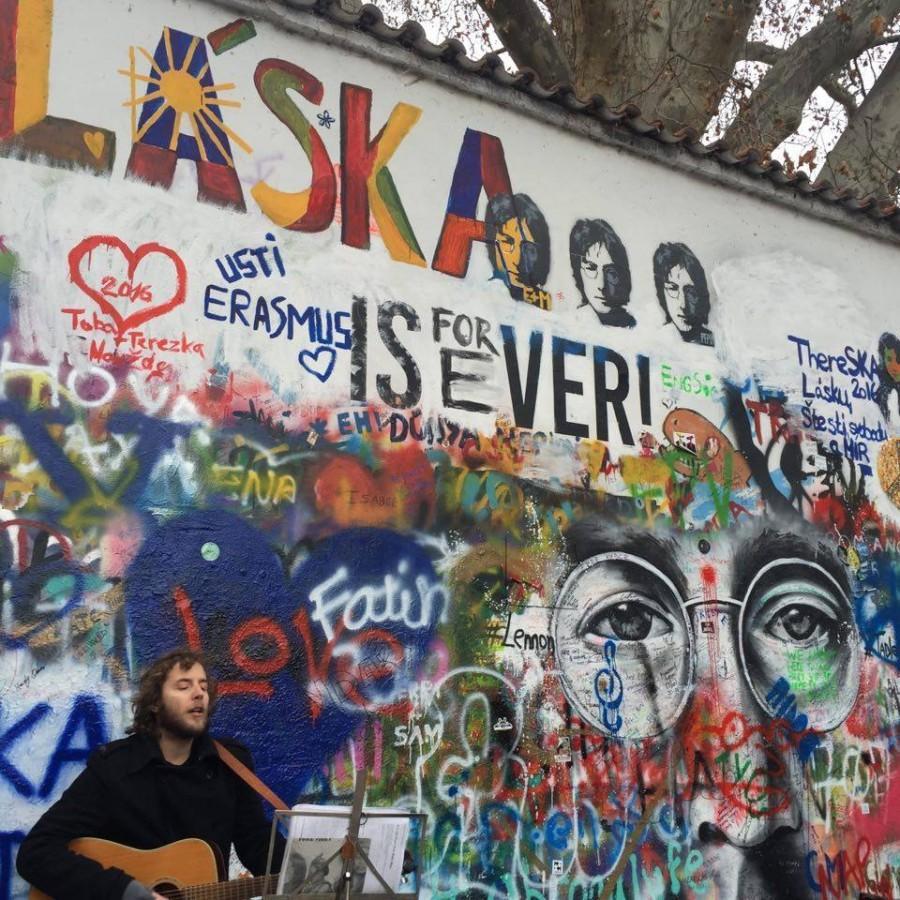Prague: American Guilt in Speaking English
Estimates have found that more than 6,000 languages spoken around the world will disappear by the end of the century.
April 28, 2016
Anywhere I go in Prague, I start with a “dobrý den.” It literally means “good day,” and it is the most common Czech greeting, especially in more formal settings. But as soon as someone starts rapidly speaking Czech in response, I have to quickly interject. “Mluvíte anglicky?” — do you speak English?
Whenever I travel, I try to learn a few easy phrases before I arrive. “Hello,” “excuse me” and “thank you” are essentials. So is “do you speak English?” Even if I do this, I still can’t get by in any language besides English.
When I was a kid, I learned Hebrew. I learned to read and write the new alphabet but I never knew what anything meant. When I started learning Spanish at 10 years old, any remnants of my Hebrew disappeared. Now I can barely read the language, and I can’t write at all.
I took Spanish for seven years and eventually reached a level where I could write essays, read poems and short stories and even understand the majority of Spanish-language movies and shows. But since I was able to surpass NYU’s language requirements, I haven’t taken Spanish classes in two years. I’ve felt myself rapidly forgetting, and whenever I overhear people speaking Spanish, I understand less and less.
Understanding only the English language makes me feel guilty and insufficient. Studying in a non-English speaking country has just amplified those feelings. I always feel like a burden in Prague when I force people to speak to me in English. What’s worse is that I’ve made no effort to try to learn any Czech besides a few key phrases. People have to go out of their way to accommodate me and I can’t say I’ve done the same.
I also often feel like I’m in an English-speaking bubble that prevents me from becoming more immersed in the culture here. I find myself shying away from trips outside of the city because I know that there will be fewer people who speak English. I’m in a limbo where I’m not quite a tourist, but I can’t act like a local because of the language barrier.
When I visited a friend at NYU Paris, she was able to do almost everything in French, from ordering food to asking for directions. Many of the students I met there had apartments and internships and seemed much more integrated into the culture than the students in Prague. One even interned for a gallery, and when we went to the gallery’s opening night, many of the students were able to chat with the artists and the gallery owner entirely in French.
A UNESCO estimate found that half of the more than 6,000 languages spoken around the world will disappear by the end of the century. In my classes here, we often speak about the dangers of cultural imperialism, westernization and unequal information flows. When I walk down the streets in Prague and see McDonald’s, KFC and Subway, it’s hard to ignore how guilty I feel for how omnipotent American culture has become and how much it is overpowering and ultimately silencing other cultures and identities.
On one hand, having a lingua franca — a common language — can be a rewarding experience. Once this semester, I was in a room with Czechs, Slovaks, Israelis, Americans and Hungarians, and we were all able to communicate in English. But as a few languages dominate the world, what are we giving up in exchange?
Email Gabby Brooks at [email protected].

























































































































































Rev Joseph Sikuku • Apr 29, 2016 at 2:02 pm
God bless the good work that you are doing to help people to learning english so that they can communicate with others well.i am the who are in need to learning how to speak english you help me?